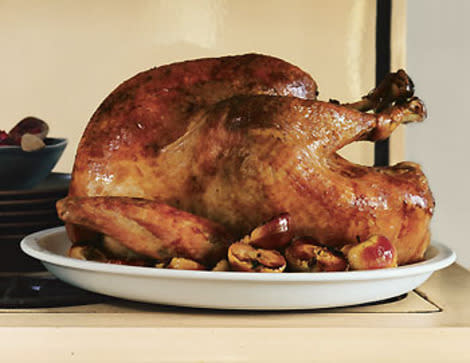Thanksgiving Turkey: Everything You Need to Know About Buying the Bird
Melissa Clark

Until recently, there were just two options when it came to turkey shopping: fresh or frozen. Now there's a whole market full of choices. Here's a rundown of the options.
Free Range: The free-range label identifies a bird that is not raised in a cage and is free to graze on any grasses or grains it can find in its pen, which is generally considered a more humane and healthy poultry farming process. The Department of Agriculture's (U.S.D.A.) food safety agency inspects all poultry processors that carry the term "free-range" to ensure that their birds really are allowed access to the outdoors. You can find free-range turkeys at larger supermarkets, specialty markets, and at your local farmer's market, where it's best to pre-order to ensure that you'll get one during the busy holiday season.
Organic: The organic label is regulated by the U.S.D.A., which requires that all turkeys sold as organic be raised free-range, without the use of antibiotics, and fed an organic and vegetarian diet of grains and grasses that have not been treated with pesticides. Organic birds are available frozen in better supermarkets and fresh or frozen from many online purveyors.
See more: Everything You Need to Know About Thanksgiving Turkeys
Natural: Unlike the U.S.D.A. "organic" designation, there's no government guarantee to back up the "natural" label. Natural turkeys are generally cheaper than organic, and are often of comparable quality, but not all natural turkeys are created equal. Read the label to find out if the bird you're considering is antibiotic-free, free-range, and/or raised on a vegetarian diet. Many products that announce themselves as "natural" also say they're "hormone-free," but this has less oomph when you consider that ALL poultry products sold with the U.S.D.A. seal (including turkey, chicken, and eggs) are hormone-free, whether advertised or not. (The U.S.D.A. has not approved the use of hormones in poultry production.) The increasing popularity and marketability of natural turkeys means they're available everywhere from the supermarket to high-end retailers to the local butcher shop.
Kosher: Turkeys with the "kosher" label are farmed according to Jewish dietary customs, with strict rabbinical supervision. The bird has been fed a vegetarian diet free from antibiotics, and has undergone a salting process after slaughter that gives the meat a moist and juicy texture when roasted-it's akin to brining but without the fuss. (Because of this, you don't want to brine a kosher bird-it's unnecessary and will make the meat far too salty.) The drawback of kosher turkeys is that the koshering process makes them harder to pluck, often resulting in quills remaining in the skin. But if you want juicy, flavorful meat, don't want to brine, and don't mind plucking a few quills (see the section below on feathers for more on how to do this), they can be a good option. Kosher turkeys are available fresh at most butcher shops (pre-ordering is recommended) and are sold frozen at some supermarkets.
Self-Basted: This category includes many of the standard turkeys you'll find in supermarkets. In an effort to retain the turkey's flavor throughout extended freezing, many companies inject the meat with a solution of salt, butter or oil, and sometimes herbs, spices, and preservatives. Self-basting turkeys require less basting during roasting, but they're definitely not for purists: Injecting meat so far ahead of cooking can give it a mushy texture and insipid flavor. If you want to steer clear, note that self-basted turkeys are often not labeled as such, so be sure to check the ingredients list: If you see anything other than "turkey," chances are it was self-basted. As with kosher birds, self-basted turkeys should not be brined, as they already have salt added.
See more: Thanksgiving Sides You Need to Make
Fresh vs. Frozen
Some cooks swear by a fresh turkey, claiming that frozen varieties are noticeably drier and not as flavorful. This is probably true if you're talking about an organic or heritage bird from a small local farm. But when it comes to supermarket brands, the difference is negligible at best. This is because the U.S.D.A. allows turkeys designated as "fresh" to be chilled as low as 26°F-well below the freezing point of water-which allows ice crystals to form and the meat to begin drying out just as it would in a fully frozen bird. Bottom line: Though fresh supermarket turkeys cost more than frozen, you won't get much more for your money.
When to Buy
Turkeys that are frozen solid should be bought at least three to five days before cooking to allow ample defrosting time. Fresh turkeys will only keep in the fridge for two days, but most supermarkets will allow you to preorder up to a month ahead during the busy holiday season-this is particularly recommended for specialty items such as kosher and organic birds. If you're buying directly from a butcher or farm, check in up to two months ahead as they may sell out early.
See more from Epicurious:
Taste Test: 3 Addictive Peanut Butters
The Secret to Stress-Free Weight Loss
Delicious Lunch Box Recipes for Kids

